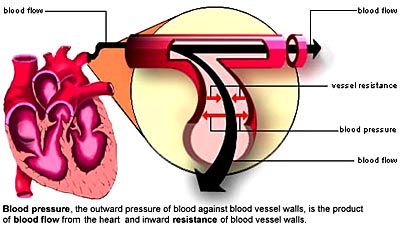 Causes of high blood pressure in 90 to 95 percent are unknown. In fact, an individual can have high blood pressure for years without knowing it. That`s why it`s known as the `silent killer` and it creeps up on the patient for years. When the cause is unknown, the situation is called essential or primary hypertension. Factors that may lead to high blood pressure in the remaining 5-10 percent of cases are known as secondary hypertension. Some of the usual causes of high blood pressure include kidney abnormality, a structural abnormality of the aorta (the large blood vessel leaving the heart) existing since birth and narrowing of certain arteries.
Causes of high blood pressure in 90 to 95 percent are unknown. In fact, an individual can have high blood pressure for years without knowing it. That`s why it`s known as the `silent killer` and it creeps up on the patient for years. When the cause is unknown, the situation is called essential or primary hypertension. Factors that may lead to high blood pressure in the remaining 5-10 percent of cases are known as secondary hypertension. Some of the usual causes of high blood pressure include kidney abnormality, a structural abnormality of the aorta (the large blood vessel leaving the heart) existing since birth and narrowing of certain arteries.
The above-mentioned causes can usually be corrected. For example, doctors can repair a narrowed artery that supplies blood to a kidney. Most of these problems can be ruled out by a careful history, a physical examination and a few tests. Special tests are sometimes needed, but the patients usually have to stay in the hospital. The heart pumps blood through the body`s arteries. The large arteries that leave the heart taper into smaller arteries called arterioles. The arterioles then taper into smaller vessels called capillaries, which supply oxygen and nutrients to all the organs of the body. The blood then returns to the heart through the veins.
Certain nerve impulses cause the arteries to dilate (become larger) or contract (become smaller). If these vessels are wide open, blood can flow through easily. If they are narrow, it is harder for the blood to flow through them, and the pressure inside them increases. Then high blood pressure may occur. When this happens, the heart becomes strained and blood vessels often get damaged. Changes in the vessels that supply blood to the kidneys and brain may cause these organs to be affected. The heart, brain and kidneys can hold increased pressure for a long time. High blood pressure is a major risk factor for stroke, heart attack, heart failure and kidney failure.
Certain nerve or endocrine disorders, prolonged bed rest and decreased blood volume due to severe bleeding (hemorrhage) or dehydration results in imbalance of blood pressure. Blood pressure less than 120/80 mm Hg is generally considered ideal. Levels higher than this increase your risk for cardiovascular disease.
High blood pressure adds to the workload of the heart and arteries. If high blood pressure continues for a long time, the heart and arteries may not work as well as they should. Other body organs may also be affected. There is increased risk of stroke, congestive heart failure, kidney failure and heart attack. When high blood pressure exists with obesity, smoking, high blood cholesterol or diabetes, the risk of heart attack or stroke increases several times.




















